No harder than when she came out as vegetarian!
September 23rd, 2016 | Published in Favorites, Gender; Sexuality
“How was it for you when your daughter came out as lesbian?” my friend asked.
 We were standing at the mirror in the change room at the swimming pool, a routine catch-up spot. I was a little surprised by the question, coming as it did several years after the fact, but knew that Ariel was genuinely interested.
We were standing at the mirror in the change room at the swimming pool, a routine catch-up spot. I was a little surprised by the question, coming as it did several years after the fact, but knew that Ariel was genuinely interested.
“It wasn’t a big drama. We were lolling on my bed, chatting about this and that, and Maz asked if I would go with her to the pride march, in Melbourne late summer. To mark her coming out. I said ‘of course’; we had a big hug, and I asked if she would also like her father, her brother and his fiancé to go. She would, she said, and we ended up having a fun day ambling through St Kilda, cheered along by summer crowds barracking from footpaths, outdoor eateries and pub balconies, with Maz making occasional high-spirited leaps arms flung wide.”
She seemed happy, and I felt happy for her. Another mother I read about recently said of her transgender child: “I’m going with the flow – even if that sounds corny.”
I would pretty much say the same.
Did you already know?
“Were you surprised when she told you?” Ariel asked. “Or, did you already know?”
“I think we all knew, and knew that we all knew, but thought it was Maz’s place to name it, when she wanted to. Or not.”
How do you explain it?
“Do you think it’s nature or nurture?” was Ariel’s next question.
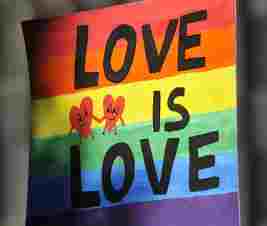 “Oh, gosh…I think it just is. I don’t even really wonder where it comes from, or about most of the questions parents apparently ask themselves (Can it be changed? What did I do wrong? What will family and friends think?) Why should I, any more than parallel questions about heterosexuality? People don’t have conversations about what ‘caused’ my son’s heterosexuality. Or anybody else’s – do they?”
“Oh, gosh…I think it just is. I don’t even really wonder where it comes from, or about most of the questions parents apparently ask themselves (Can it be changed? What did I do wrong? What will family and friends think?) Why should I, any more than parallel questions about heterosexuality? People don’t have conversations about what ‘caused’ my son’s heterosexuality. Or anybody else’s – do they?”
“Maybe not, but aren’t you being a bit disingenuous?” Ariel came back. “People don’t wonder about the mainstream. They wonder about the margins, and minorities. Why do some children have cerebral palsy, for example, rather than why do most not? Why are some transgender, but not many? Where does extreme brilliance come from, or ultra-athleticism, rather than why are most people relatively ordinary?”
“I guess so,“ I said, only a little grudgingly (I hope). “But maybe that illustrates why it’s important to ask about all sexualities – or none. When it’s only the minorities, there’s a sense that heterosexuality is ‘normal’, a bit like having two legs, and anything else is abnormal. But, I think it’s more that sexuality is diverse, and different forms occur with different frequencies.”
“That’s where I struggle,” said Ariel. “As a Christian, the bible’s clear. And yet, my heart says love is love.”
“I would have thought the bible could be used to support tolerance or intolerance, depending on what parts you focus on.”
“It’s about context. Interpreting the bible in context.”
“Maybe, but if the bible also says women can’t preach, isn’t it also about history and social change and the bible needing to be updated to current times?”
“I need to think some more.”
“For me, the sexual behaviour of consenting adults is so not something I think religion should dictate, and I get angry when it does, particularly currently in relation to marriage equality, so I’m probably not the best person to talk to.”
Do you worry?
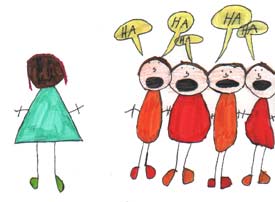
“Okay,” said Ariel, with her characteristic generosity. “What about other worries – like missing out on grandchildren? Or, her not having anyone to look after her?”
“She doesn’t show any inclination to have children, never has, although plenty of lesbians do become mothers, and she could too if she wanted to. Or, she might have a relationship with someone who has children, or wants them. I’d be happy with any grandchildren, but don’t have expectations, and don’t think she needs looking after. She’s pretty good at doing that for herself.
I do worry, in general, about prejudice, discrimination, violence and vitriol against non-hetero people, although I don’t think Maz would see herself as personally seriously exposed. She has good friends, family, and her career as an illustrator also provides a buffer to some extent.
I would worry a lot more if she lived in parts of the world where homosexuality is punishable by death and there are no safe places for people to meet and just be themselves.
In Australia, I don’t worry about her more than if she was in a heterosexual relationship, to be honest, and that’s something else people don’t tend to have conversations about – how much we worry about our hetero daughters and whether they could end up with abusive men, or how much we do, or should, worry about our hetero sons and how they treat women.”
“Is that something you worry about?”
“I paid a lot of attention when my son was younger, and I’m pleased to be able to say I’m comfortable with his adult values. More generally, though, I think we need to shift the balance from teaching girls to be ‘careful’ to teaching boys to take responsibility for their own behaviour.
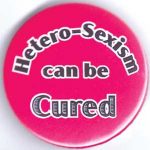 And, we definitely need to teach everyone about human rights and dignity and the need for mutual respect, regardless of race, gender, age, ability, sexuality, or any other dimension of discrimination.
And, we definitely need to teach everyone about human rights and dignity and the need for mutual respect, regardless of race, gender, age, ability, sexuality, or any other dimension of discrimination.
And, there’s a question: Why don’t we ask about the causes of homophobia and heterosexism and inequality in all its forms? Rather than about the ‘causes’ of every other form of sexuality apart from hetero?”
“Uh-oh! Is that a soapbox you’re stepping onto?” Ariel laughed.
No harder than when she became vegetarian!
“Okay, okay. But one final thought – It was actually harder for me to adjust to my daughter’s vegetarianism than her sexuality.”
“Really?”
“Yes. It was pretty big in a couple of ways. Maz was still living at home, and we’d always eaten together in the  evenings. I did most of the cooking, so pretty much had to revise my list of dinners. And, not being the world’s most skilled cook, that wasn’t a simple matter.
evenings. I did most of the cooking, so pretty much had to revise my list of dinners. And, not being the world’s most skilled cook, that wasn’t a simple matter.
More importantly, though, I had to grapple with the ethical issues that had motivated her decision – about animal cruelty, and live export, and farming and slaughter methods, and methane production and so on. We watched documentaries, and talked, and of course I agreed with her.
So, her vegetarianism opened a can of worms that was a lot messier for me than her sexuality, which doesn’t impact directly on my life. Unlike her food choices, which challenge me to examine mine, as well as to learn to cook differently.”
“I’m sure we’ll continue this conversation.” Ariel was packing her kit. “Lots to think about.”
“I’ll try to be more understanding of your particular struggles…and not to be disingenuous! But, really, Maz’s coming out as lesbian was no big deal for me, whereas serious vegetarianism is still a ‘should’ in my life, and that’s harder.”
(NOTE: Names have been changed, to provide at least token privacy.)
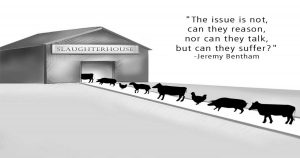
Scroll down for comments
First-time comments have to be moderated. I try to complete that process, and respond, within 24 hours. Do check back. If you liked this post, you might also like “What has sexuality got to do with parenting?” and some of the other posts in the category “Gender; Sexuality“. Browsing and general feedback are also greatly welcome.
Social justice is for everyone (previously 2020social justice) is also on Facebook (click here)
And Twitter (click here)

With much love to my beautiful daughter…Joan Beckwith
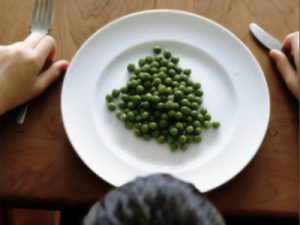



Subsequent article, introducing the idea of “flexitarianism” (choosing to be vegetarian most of the time): https://theconversation.com/love-meat-too-much-to-be-vegetarian-go-flexitarian-73741
Ironic, how much you have written about questioning categories. Stupid boxes; and yet, how else are others supposed to define us, so they can understand us and relate to us. Tragic.
It’s an interesting comment, Crissy, because I didn’t actually set out consciously to question categories, but I guess in an ideal world in which difference and diversity were accepted (maybe even celebrated!) we would be able to do away with labels. We are far from that ideal, as the current battle in Australia over marriage equality illustrates.
In a broader context I can see an argument in support of identity politics from within the non-hetero population, because they (identity politics) provide a basis from which to name and challenge prejudice and discrimination. I actually remember a time before much of the current language around sexual diversity was available, and it was pretty appalling in its absolute closeting.
Perhaps the sociopolitical challenge could be framed more generally as subverting heteronormativity…Would that work?
Thank you for sharing your personal story Joan.
For me, being a lesbian for over thirty years, my only comments is that there is still a lot of homophobic people out there in Melbourne who are not afraid to make aggressive and offensive comments. In my experience, it has usually been men who have pushed, verbally threatened, kicked over my partner’s drink, elbowed her in the back on the dance floor, been drunk and planned on coming in our tent, walked on our car roof, deliberately walked into my back at the bridge in South bank.
I think if my partner and I walked hand in hand down the main shopping strip in Sunshine, it may take some time but I bet some one, most likely male, would hurl some form of verbal abuse.
I have no doubt of the truth of what you say, Lorraine, and it’s also reflected more generally in the link within the article about prejudice, discrimination, violence, vitriol, and trolling directed at non-heterosexual people on the basis of appearance, behavior etc etc. It’s also very evident in the supposedly “civil debate” about the plebiscite on marriage equality. Our PM must be very aware of the way this will play out and it makes me furious when he professes spurious “faith” in the Australian people to be respectful. He knows his own party, and politics more broadly. This is clearly a divisive direction, and I am deeply sorry that people will suffer in the backlash. The status quo is bad enough, as you have noted, but I wish sanity would prevail to avoid making things worse.
Wonderful response and great to see your pages! Have missed your Fb intelligent, sensitive and incisive comment. ❤️
Great to have a visit from you here, Deb, and thanks for your comment. I’m still on Facebook quite a bit, but mostly on my 2020socialjustice page. When I do get to visit my Joan Beckwith profile, it’s a hit-and-miss affair at the mercy of Facebook’s algorithm, so I probably miss lots of posts I would like to connect with.